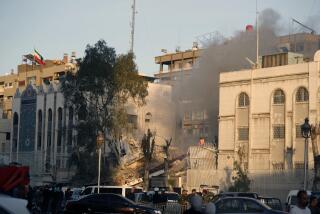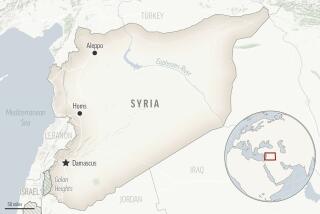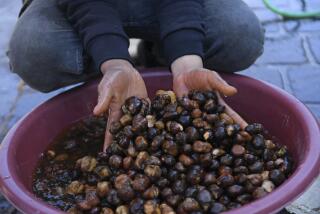Syria democracy activists say they are committed to nonviolence
More than six months after mass protests began spreading through the streets of Syria, activists say they remain committed to a peaceful rebellion against the government of President Bashar Assad, despite a rising death toll, a wave of assassinations and the reported emergence of soldiers switching sides and battling security forces.
“Our revolution remains a nonviolent one,” Omar Edelbi, spokesman for a grass-roots opposition network, the Local Coordination Committees, said in an interview Saturday in Beirut.
The network reported that Syrian forces Saturday killed at least 13 protesters, five of them in the northeastern city of Qamishli, where thousands marched to mourn the shooting death a day earlier of a charismatic Kurdish opposition leader.
The killing of Mashaal Tammo was the latest in a wave of assassinations that has exacerbated tension and fanned sectarian fear in a nation of geopolitical importance to Washington and regional states, including Israel and Iran.
The opposition has blamed the regime for the targeted killings, which the government has attributed to “armed gangs” and “terrorists,” its coded characterization of street demonstrators and their organizers.
The uprising’s public face as a peaceful pro-democracy movement has helped garner international sympathy and counter government assertions that the unrest is the handiwork of armed extremists backed by foreign powers. Protest leaders have publicly rejected violence, even in the face of government crackdowns that the United Nations says have killed nearly 3,000 people.
Recently, however, armed clashes have emerged as another facet of the struggle, raising the specter of a more militarized conflict.
A group of self-described defectors called the Free Syrian Army says it has mounted attacks against the regime.
Starting in late September, army defectors and government forces exchanged fire for almost a week in the central city of Rastan, leaving several dozen dead and thousands jailed, according to regime opponents.
Protest leaders say they recognize the legitimacy of the defectors’ struggle, but distance the armed resistance from the popular street demonstrations regularly filmed and posted on the Internet.
“We support the defectors’ right to defend themselves,” said Edelbi of the Local Coordination Committees. “But they are separate. We do not coordinate with them. We believe in peaceful means.”
There have long been reports that some Syrians had taken up weapons. But organizers insist that armed militants have been a tiny minority, despite the availability of weapons in Syria, a nation where arms are said to filter in from Lebanon and Turkey.
“If people wanted an armed rebellion, they would have taken out rifles and guns a long time ago,” Edelbi said.
Assad’s opponents worry that any trend toward armed insurrection could play into the president’s hands and erode the protest movement’s moral prestige, domestically and abroad.
“The regime prefers guns on the streets to peaceful protests,” said Amr Al-Azm, a Syrian opposition figure who teaches at Shawnee State University in Ohio. “Then they can say: ‘We were right. We’re dealing with armed gangs.’”
Armed insurgents would undoubtedly face daunting obstacles in the ethnically and religiously mixed nation. Many Syrians fear the kind of sectarian conflicts that have devastated neighboring Iraq and Lebanon.
“That’s a battle they know how to fight,” Al-Azm said of the prospect of the government in Damascus battling an armed insurgency. “The balance of equipment, weapons and training is all in their favor.”
Even as the size of protests has diminished, activists say, unarmed Syrians are taking to the streets almost daily — with the near certainty that some will lose their lives.
Last week, the United Nations revised the death toll in the unrest to 2,900. The government says more than 700 security personnel have been killed.
The killing Friday of Tammo, the Kurdish activist, was the catalyst for a new round of protests Saturday, notably in Qamishli, the heavily Kurdish city along the Turkish border where he was gunned down. Also injured in the attack were a colleague and Tammo’s son, according to government and opposition accounts.
Activists said the incident could spark even greater Kurdish participation in the protests.
The opposition blamed government thugs for the killing and said Tammo, among the country’s best known Kurdish political activists, had recently survived an assassination attempt.
Syria’s Kurdish minority has voiced various grievances, including discrimination on the basis of ethnicity, allegations of stolen land and the stateless status some endure because of a lack of citizenship papers.
The Syrian government news agency cited “informed sources” saying that four attackers opened fire with machine guns, killing Tammo and injuring the other two. The government blamed “an armed terrorist group.”
Elsewhere, activists reported that demonstrators in Amuda, outside Qamishli, toppled a statue of the late Hafez Assad, who ruled for almost three decades and was succeeded by his son Bashar.
More to Read
Start your day right
Sign up for Essential California for news, features and recommendations from the L.A. Times and beyond in your inbox six days a week.
You may occasionally receive promotional content from the Los Angeles Times.





